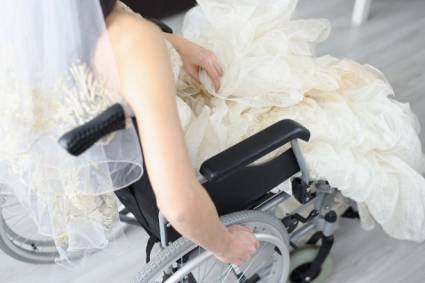Our Work
The Right to Marry
Barriers to intimacy for persons with disabilities

To get married, too many persons with disabilities must overcome attitudinal and institutional barriers. Image from Microsoft PowerPoint 2023
The right to marry has long been recognized as a fundamental human right around the world. In this vein, Article 23 of the Convention on the Rights of Persons with Disabilities (CRPD) requires States Parties to “eliminate discrimination against persons with disabilities in all matters relating to marriage, family, parenthood and relationships, on an equal basis with others.” Yet, despite the CRPD’s protections, persons with disabilities across the world face barriers to marriage, relationships, and intimacy.
For example, researchers, including HPOD's Executive Director Michael Ashley Stein, who explored the intimate lives of Arab Israelis with disabilities found widespread negative social perceptions about persons with disabilities’ prospects for marriage and intimate relationships. Moreover, many persons with disabilities had internalized societal stigma: “when the disabled person sees that people with disabilities hardly marry, this increases self-stigma and the fear of rejection." Intersectionality certainly compounds these dynamics, as the researchers found that women with disabilities are less likely to get married compared to men with disabilities, and women with disabilities are more likely to face discrimination and societal stigma. This stigma affects the way disabled women are chosen, or not chosen, by partners. Stigma also manifests in the way disabled women may or may not be allowed to work, and the way disabled women are seen as inadequate homemakers and mothers compared to non-disabled women. The researchers underscored an urgent need to combat these negative social attitudes to create a more inclusive environment.
In the United States, some of the very systems designed to support persons with disabilities to live independently in the community effectively codify such attitudes. For example, recipients of Supplemental Security Insurance (SSI), a federal benefits program on which many adults with disabilities who are excluded from the workforce rely, are financially disincentivized from marrying. The federal government as a matter of policy reduces or at times rescinds SSI benefits from recipients if they marry. This “marriage penalty” serves as a significant deterrent because in order to qualify for the program SSI recipients must have little to no income and assets. As a result, people who qualify for disability benefits “generally cannot continue to receive benefits if they marry someone who is not disabled or retired.” Lori Long, whose partner is not disabled, has expressed frustration with this policy:
“When they wrote the Social Security laws, they weren’t thinking that young people with disabilities would ever be marriage material… People didn’t think we might have dreams and hopes like everybody else. We do.”
Additionally, eligibility for Medicaid hinges upon one’s eligibility for SSI; thus, if someone loses their SSI eligibility, they can also lose their Medicaid eligibility and access to services designed to prevent them from living in an institution. For Gabriella Gabrero, who risks losing her SSI benefits if she marries her non-disabled fiancé, “SSI is the gateway for me to qualify for Medicaid… [and] Medicaid is what keeps me alive.”
Even where persons with disabilities overcome these barriers to marriage, they still face obstacles to living married lives on an equal basis with others. For example, persons with disabilities subject to guardianship orders are often denied the legal capacity to enter into marriage contracts. Also, some group homes deprive residents with intellectual disabilities of the right to live with their partners. After Paul Forziano and Hava Samuels married in 2013, their separate group homes both refused to allow them to live together because, according to the group homes’ staff, permitting the couple to live together would be "unprecedented," "impossible," and "fraught with difficulties." The couple sued their group homes for disability-based discrimination, but lost. The court found that the group homes’ refusal was “based not on [their] disabilities, but rather on their status as a married couple,” and therefore did not run afoul of the Americans with Disabilities Act. Although ultimately another group home operator offered to allow them to live together, here, disability rights legal protections were insufficient to guarantee them their right to live together like any other married couple.
Many adults with intellectual disabilities in group living arrangements also face additional barriers to forming lasting intimate relationships. Specifically, as Stein and HPOD's Director of Advocacy Initiatives Hezzy Smith have written, many group homes either outright prohibit sexual activity or require adult residents to pass sexual consent capacity evaluations before they can engage in sexual activity. Justified by “health and safety concerns,” providers’ regulation of adults with intellectual disabilities’ sexual lives can also reflect paternalistic beliefs that disability disqualifies a person from the right to have intimate relations. In some cases, capacity-based sex restrictions may be conducted by biased individuals or purposefully designed to generate low pass rates as a hedge against legal liability. At the same time, too few group homes proactively facilitate their residents’ access to sexual education programs, though these have been shown to increase adults with intellectual disabilities’ capacity to consent to sexual activity.
If implemented effectively, the CRPD’s legal protections of the right to marry and the right to intimate relationships could combat the negative attitudes about persons with disabilities’ sexuality as well as the discriminatory laws and policies that convert such attitudes into formal restrictions.
Mackenzie Saunders is a Class of 2025 J.D. Candidate at Harvard Law School.




